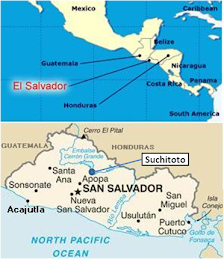
In two consecutive days I had the opportunity to witness the very different realities of people in rural areas and cities in El Salvador.
On Monday I accompanied a group of Progreso, a community organization, to a workshop for young people in Copapayo, a rural community of Suchitoto. The workshop was about the culture of violence and peace, and also democracy. When I saw the materials they prepared, they look very professional, with pedagogic materials, paper, tape, markers, scissors, etc. The rural community is not too far away from the urban centre of Suchitoto; however, the trip took about one hour in a small non-asphalted rural road. This time of the year weather is dry, but I can imagine that the road will not be very friendly when the rain seasons starts in May. Also, there is this bridge that was partially destroyed by a hurricane some time ago. During the dry season, cars can cross although with some difficulty. The problem is during the rains because the level of the river increases dramatically, water covers the damaged part of the bridge, and people cannot use it anymore. They have to use canoes to cross the river or take a very long way to access the closest urban area.
There was a pick-up truck available for transportation. Six people were in the cab and eight people were in the open cargo area (I was one of them). The classroom was an open area besides a building, and the heat of the day was almost unbearable. Despite of the heat and the technical difficulties the workshop went well. I had a meeting in the afternoon so I had to get back to Suchitoto by myself. I took one of the only two bus routes that go from Copapayo to Suchitoto during the day and I arrived safely to the urban area one hour later.
On Tuesday, on other side of the story, I went for the first time to San Salvador, the capital. I had my concerns because of its bad reputation and comments I heard before. After a day in the city, I am definitely less concerned. This is a modern city that looks with good infrastructure, streets in good shape, and people seem very relaxed walking on the streets, at least in the areas I walked. As oppose to Suchitoto, people did not say hello in the street. I went to the nicer part of the city, but I know there are other areas with big social issues. As any big city, life in common areas is impersonal and traffic is chaotic in some spots. I entered to Galerias Mall, a modern shopping centre with worldwide recognized fashion shops, a very nice food court, air conditioned, and all the amenities of the modern world. I went to a coffee shop, had an American-like coffee with a pie and I felt in a completely different world. Then a group of religious ladies sat in a table besides mine and said hello. At that point a new I was still in El Salvador.
The community of Copapayo and the Galerias Mall are about 60 kilometers away from each other, but these are two extremes faces of development: one full of physical challenges, the other full of physical comfort. I am glad that in both world I still found people smile and say hello to strangers.





























